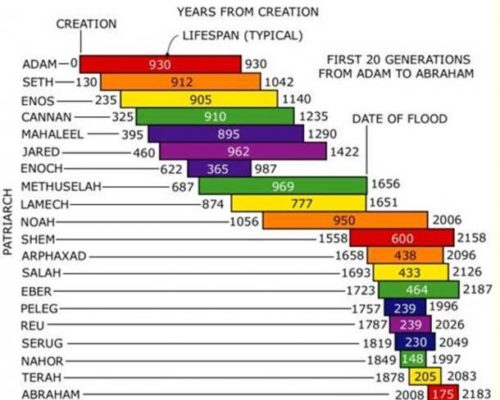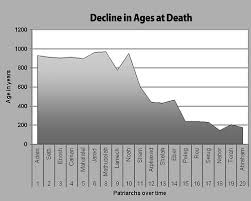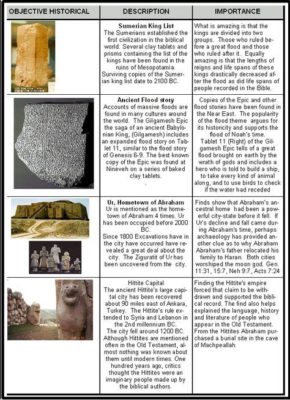Reasons for believing in the longevity of Adam & others:
Let’s first deal with some of the objections to they’re living that long. Then we’ll deal with the possibilities of they’re living that long. But before we do, we need to define our method of either proving or disproving this.
1…some people want to use the scientific method. What is the scientific method? To use this method, we need to be able to do three things;
A. Observe the event we’re talking about
B. Measure this event
C. Repeat steps 1&2 many times to verify our results
Step A we obviously cannot do as all of the people are dead. Because we cannot do Step A,
we cannot do Steps 2&3. Hence, we cannot use the scientific method.
2…the historical/legal method. Because we cannot use the scientific method, we will use the historical/legal method of proof. This method uses all of the existing evidence. If its enough, a conclusion can be drawn. That conclusion may be beyond a reasonable doubt but not beyond any doubt. If its not enough evidence, then we cannot make a conclusion.
Its important enough to point out that we may use some science in our investigation but this is not the scientific method. Things that involve history or the legal field all use this method and it’s the one that we’ll use in our investigation.
Objection #1: The years in Genesis 1-11 are not the same as our years. After all, Peter said that 1 of our days are as 1,000 days with the Lord and vice versa (2nd Peter 3:8).
Refutation: Where does it say that the years in Genesis 1-11 are not real years? And why stop interpreting numbers as symbolic with Genesis 11? Why not always interpret them as symbolic? Why believe that Jesus was in the grave for just 3 literal days? For that matter, why believe any numbers in the bible as literal at all? Accepting Genesis 1-11 numbers as anything other than real numbers produces major problems with other ‘numbered’ scriptures.
In context, some scoffers were mocking those who believed in the 2nd Coming of Jesus. Peter is saying that God’s timing is different than ours. What may be ‘soon’ to the Lord, may not be ‘soon’ to us. To apply this verse to Genesis 1-11 is to take it out of it’s context.
Objection #2: Nobody lives that long. Science and just observing how long people live has disproven that.
Refutation: Methinks you’re giving too much credit to science. We don’t fully understand the aging process yet. Telomeres are a good example of a recent discovery. They are long, repetitive DNA sequences at the end of human chromosomes. With each division of one cell, telomeres get shorter. When they become too short, the cell stops dividing. When enough cells stop dividing, we eventually die. Science has not found a way to repair these telomeres or a way to lengthen them. But this doesn’t mean there isn’t a way. What if Adam’s telomeres repaired themselves (many of our bodily cells do this now) or were lengthened to begin with and something happened to change them? Remember, the bible says that humans were created to live forever (Genesis 2:17, Revelation 22:5). Our bodies already have an incredible self-repairing system. In a perfect world (heaven), what if our bodies repaired themselves perfectly? How hard would this be for the God that created the entire universe?
Objection #3: But there are other genetic determinates to aging. What about our cells mutating due to sunlight, climate conditions or things like viruses?
Refutation #1: Very good point! A mutation is any change in the DNA sequence of a cell. All known mutations cause a loss of information. We inherit mutated cells from our parents and we produce some more of our own (from sunlight, viruses, etc.). It may yet be possible to stop cells from mutating or for cells to repair the damage done by a mutation. Just because we can’t do it now doesn’t mean that God couldn’t do it in the future.
Adam & Eve were created to live forever. It’s reasonable to assume that their cells either had no mutations to start with or their cells had a self-repairing mechanism. But when they sinned, God had warned them that they would die (Genesis 2:17). At this point, their cells began to mutate/deteriorate. Over time, the number of mutations and the effect these mutations had on their bodies increased. But remember, initially their bodies didn’t have all the mutations that we presently have. And before the Flood, the climate was probably more conducive to extending life. These two things may have allowed them to live several hundred years, while slowly declining in longevity. After the Flood, the climate may have changed enough to speed up this decline to the present maximum 120 years.
Refutation #2: Similar claims of long life spans are found in the ancient literature of the Babylonians, Greeks, Romans, Indians, Chinese, Persians and many other cultures.
The Sumerian Kings list (see above) provides support for the long lives of the ancients. This list mentions a flood. It also gives the lengths of these kings reigns before and after the flood. The kings reigns are hundreds of years longer before the flood but decrease significantly after it.
Conclusion:
Weighing all the evidence together, it seems to lead us in the direction of accepting that ancient peoples may have lived these long lives. While the proof is not 100%, it never could be as we weren’t there to observe their lives. But it does raise some interesting points, so its not out of the realm of possibility entirely.
But the comforting thing to know is that we Christians will live forever in eternity with God. So whatever afflictions we may experience in this life, they are but a tiny wisp of air compared to living eternally with God.
References:
The New Answers Book 2
https://creation.com/living-for-900-years
https://www.ancient-origins.net/human-origins/did-ancient-people-really-have-lifespans-longer-200-years-002093
For His Kingdom,
Dave Maynard
https://BSSSB-LLC.com









